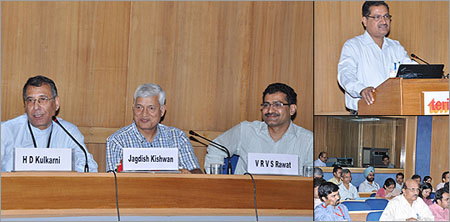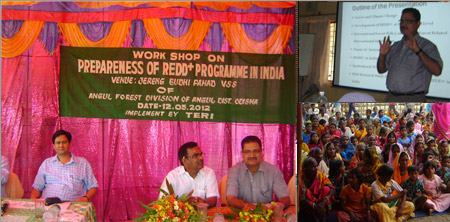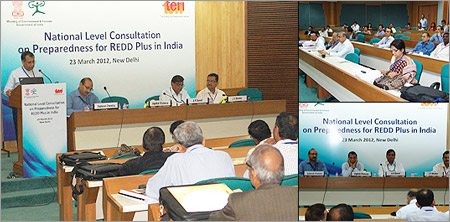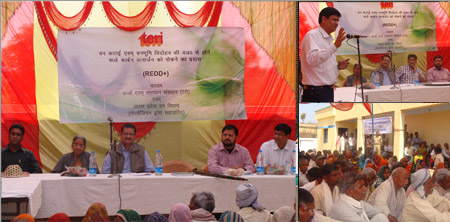Climate Change Activity 2(b)
REDD Plus
Publications
--- Policy Briefs
Institutional Framework for Implementing REDD+ in India
Conservation of biodiversity and ecosystem services by REDD+ project in India
Forest governance and implementation of REDD+ in India
Livelihood of local communities and forest degradation in India: issues for REDD+
Methodology for assessing carbon stock for REDD+ project in India
--- Other publications under NFA
Studying Potential Impacts and Response Options for REDD Plus
The paper reviews the policy, regulatory and institutional framework of forest governance in India. The gaps in the policy, regulatory and institutional framework are identified. The paper suggests directions for policy interventions to overcome the gaps identified. Institutional arrangement for implementation of REDD-plus under the forest governance framework is described in the paper. Recommendations include safeguards to be adopted under REDD-plus and possible forest governance models. Decentralization of forest rights and community based forest governance is identified as critical to the success of REDD-plus. Community based forest governance is a form of participatory and inclusive management and a key factor for implementation of REDD plus in India.
Read more...Book on Sustainable Forest Management and REDD+ in India
 REDD+ is a financial instrument to incentivize conservation and sustainable management of forests, and thereby achieve reduction in the GHG emissions resulting from deforestation and forest degradation. It aims at compensating forest owners in developing countries for conserving their forests by putting a value on the forest carbon stocks — one of the many ecosystem services that forests provide. The notion of REDD+ is based on two basic premises.
REDD+ is a financial instrument to incentivize conservation and sustainable management of forests, and thereby achieve reduction in the GHG emissions resulting from deforestation and forest degradation. It aims at compensating forest owners in developing countries for conserving their forests by putting a value on the forest carbon stocks — one of the many ecosystem services that forests provide. The notion of REDD+ is based on two basic premises.
Read more
Studying Potential Impacts and Response Options for REDD Plus
REDD (Reducing Emissions from Deforestation and Forest Degradation) is the global endeavour to create an incentive for developing countries to protect, better manage, and save their forest resources, thus contributing to the global fight against climate change. REDD+ goes beyond merely checking deforestation and forest degradation, and includes incentives for positive elements of conservation, sustainable management of forests, and enhancement of forest carbon stocks (FCS).
Read more...International Architecture of REDD+: Implications for India
The report analyzes the international architecture of REDD+ with reference to existing and emerging literature and negotiations, to expectations in the investing countries. In the discussion of REDD+ implementation, special attention is given to the role of Sustainable Forest Management (SFM) in the process of building REDD+ readiness in a developing country such as India. To the extent that Norway remains one of the largest sources of REDD+ funding, this country’s expectations and its role as an actor in boosting the demand for forest conservation are discussed. The role of the broader donor community, including multilateral organizations, is also examined. National and international forest policies are continuously evolving and path dependency is often a part of the process. The current analysis delves into forest policy trends and their historical context when rendered necessary.
Read more...Assessment for Designing REDD Plus Projects in India
This report provides an assessment of India's potential to implement a REDD+ Project at the ground level, based on a review of the current international architecture on REDD+, an analysis of response options and impacts at the national level and a field level assessment in five pilot locations across the country. While the outputs of the first two components have been consolidated into a separate study report, a series of policy briefs and workshop proceedings, the present report focuses on the field level assessment, providing a detailed methodology for carbon stock estimation, and reporting the results of the assessments of carbon stock changes, forest dependence, sustainability of forest resource extraction and institutional mechanisms at each pilot location. Wherever relevant, an analysis of gender issues and non-carbon ecosystem services is also provided.
Read more...Journal of Sustainable Forestry
The present study seeks to fill this knowledge gap by assessing the carbon sequestration and economic potential of three extensively used medicinal tree species of Emblica officinalis (Amla), Terminalia belerica (Bahera), and Terminalia chebula (Harar) in the state of Sikkim with the help of the project-based comprehensive mitigation assessment process (PROCOMAP) model. The findings of this research suggest that the selected species of Amla, Bahera, and Harar have significant carbon sequestration rates of 1, 2.64, and 1.42 tC ha−1 yr−1, which could generate Indian National Rupees (INR) 844, 1,198, and 2,228 ha−1 yr−1, respectively from carbon revenues in a $5/tCO2 scenario through various ongoing carbon forestry schemes.
Read more...Implementation of Forest Rights Act, changing forest landscape, and 'politics of REDD+' in India
Ashish Aggarwal
Resources, Energy, and Development 8(2): 131–148
Abstract: Peoples' rights over forest resources are being recognized under FRA in a comprehensive manner for the first time in independent India. Although a number of challenges of implementation are yet to be addressed, it has started changing the forest landscape of the country by redefining the relationship between the state and the people with regard to the use and management of forest resources. Close to 1.169 million claims for individual and community rights, covering about 3% of the forest area of the country, have been recognized up to 30 April 2011. People are expected to have much more control over the resources if FRA is implemented in its true spirit. While FRA is being implemented, the Government of India wants to leverage its forest conservation record in international climate change negotiations through REDD+. India considers REDD+ to be a bargaining chip in the negotiations. Civil society groups, however, are strongly contesting this instrument, as they fear REDD+ might provide an opportunity to the government to scuttle implementation of FRA. This contestation or politics of REDD+ is being negotiated and renegotiated continuously, where different stakeholders are guarding their own interests.
Read more...
Events
Proceedings of CBD CoP 11 Side event on "REDD Plus Architecture and its Releveance for Developing Countries
Date: 11 October 2012Venue: HICC-HITEX, Hyderabad
The CBD COP 11 side event on REDD Plus Architecture and its Relevance for Developing Countries on 11th October, 2012 brought together a panel of speakers who presented REDD Plus experiences from South Asia, South-East Asia and Africa. In addition, country positions and/or country level implementation issues were shared by speakers from India, Nepal, Pakistan and Bangladesh. The audience consisted of a good mix of different country researchers, field experts, government officials, diplomats, students, NGO representatives and community representatives.
Read more...Community Level Consultation on REDD+ in Dhanaulti
Date: 17 September 2012Venue: Dhanaulti
Under the Norwegian funded project on REDD+ in India: Issues and Challenges, one of the REDD+ pilot sites is selected in the Mussoorie division. To facilitate the assessment of REDD readiness of this site, a socio- economic survey was held in the beginning of the year 2012. On 17th September, 2012, a community level consultation was held in Dhanaulti Eco Development Park to interact with the villagers of the 3 villages (Raaton Ke Beli, Jhalki, Suwa Kholi) that had been surveyed for the REDD+ Mussooriee Division site. The workshop was done in consultation and with close cooperation of the Uttrakhand forest department.
Read more...National Level Workshop on International Architecture on REDD+ and its relevance to India
Date: 14 June 2012Venue: Casuarina Hall, India Habitat Center, New Delhi
 TERI in collaboration with the Ministry of Environment and Forests (MoEF) organized a National Level Consultation Workshop on 'International REDD Plus (Reducing Emissions from Deforestation and Forest Degradation) architecture and its relevance for India' on 14 June 2012 in New Delhi.
TERI in collaboration with the Ministry of Environment and Forests (MoEF) organized a National Level Consultation Workshop on 'International REDD Plus (Reducing Emissions from Deforestation and Forest Degradation) architecture and its relevance for India' on 14 June 2012 in New Delhi.
The workshop was organized as a part of the project 'Designing REDD+ pilot project in India' funded by The Norwegian Ministry of Foreign Affairs. The objective of the workshop was to analyze various issues impacting the design of the international REDD+ architecture such as the institutional and financial mechanism, carbon markets, and MRV among others. The workshop further deliberated and debated upon the possible design of the REDD+ mechanism at a national level.
In his inaugural address Mr A K Bansal, Additional Director General of Forests, Forest Conservation, MoEF, GoI emphasized the need to adopt a holistic approach while formulating REDD+ projects in India. The national level architecture should be inclusive of the biodiversity concerns as well as sensitive to the rights of the indigenous communities.
The workshop saw active participation from senior representatives of State Forest Departments, National Level Forestry and related Institutions, International organizations, and other key stakeholders.
Read more...Proceedings of the Local Level Workshops in Angul, Odisha
Date: 12 May 2012Venue: Angul, Odisha
 TERI in association with Ministry of Environment and Forests (MoEF), Government of India and the State Forest Department, Odisha has organized two local level workshops one at Bhubaneswar and another at Jereng village of Angul district on 12th May 2012 in Odisha. The workshop organized at Bhubaneswar was chaired by Shri A. K. Bansal, Additional Director General of Forests, MoEF and coordinated by Dr. J V. Sharma and Mr. Suresh Chauhan of TERI, New Delhi, while another workshop was chaired by Shri J. K. Tiwari, ACCF, Odisha and Dr. J V Sharma, TERI, New Delhi.
TERI in association with Ministry of Environment and Forests (MoEF), Government of India and the State Forest Department, Odisha has organized two local level workshops one at Bhubaneswar and another at Jereng village of Angul district on 12th May 2012 in Odisha. The workshop organized at Bhubaneswar was chaired by Shri A. K. Bansal, Additional Director General of Forests, MoEF and coordinated by Dr. J V. Sharma and Mr. Suresh Chauhan of TERI, New Delhi, while another workshop was chaired by Shri J. K. Tiwari, ACCF, Odisha and Dr. J V Sharma, TERI, New Delhi.
Meeting of REDD+ at Delakhari, Chhindwara, Madhya Pradesh
Date: 7 April 2012Venue: Chhindwara, Madhya Pradesh
The Meeting of REDD+ at Delakhari, Chhindwara, Madhya Pradesh was conducted on 7th April 2012. The meeting involving local communities involving JFMCs of Khatuadhana and Anjandhana was conducted in the premises of the Forest Guest House of Delakhari Forest Range, West Chhindwara Forest Division.
Read more...A workshop at Chindwara district of Madhya Pradesh, Angul district of Orissa, and Sundarbans of West Bengal are proposed from April-June 2012.
Date: 7 April 2012Venue: Chhindwara, Madhya Pradesh
The Meeting of REDD+ at Delakhari, Chhindwara, Madhya Pradesh was conducted on 7th April 2012. The meeting involving local communities involving JFMCs of Khatuadhana and Anjandhana was conducted in the premises of the Forest Guest House of Delakhari Forest Range, West Chhindwara Forest Division.
Read more...National Level Consultation on Preparedness for REDD Plus in India
Date: 23 March 2012Venue: Gulmohar Hall, India Habitat Centre, Lodhi Road, New Delhi
 REDD means reducing emissions from deforestation and forest degradation, and + means enhancing carbon through sustainable management of forests, without sacrificing the ecosystem services, livelihood and biodiversity. Thus, REDD+ is sustainable forest management. The only difference is additionality of carbon which would be tradable in the international and national markets. The global community from the developed nations will pay for the carbon sequestration, since it is a serious environmental concern at the global level. Under the REDD+ project, national, sub-national and local environmental, social and economic concerns have to be taken carefully at the National level.
REDD means reducing emissions from deforestation and forest degradation, and + means enhancing carbon through sustainable management of forests, without sacrificing the ecosystem services, livelihood and biodiversity. Thus, REDD+ is sustainable forest management. The only difference is additionality of carbon which would be tradable in the international and national markets. The global community from the developed nations will pay for the carbon sequestration, since it is a serious environmental concern at the global level. Under the REDD+ project, national, sub-national and local environmental, social and economic concerns have to be taken carefully at the National level.
The workshop was designed to apprise regarding the concept of REDD+ and to seek views of all the States how to include elements of REDD+ in day today forest management. The important issues for REDD+ are forest governance, methodologies for carbon assessment, conservation of biodiversity and maintainace of ecosystem services, livelihood and market for carbon trading. The agenda for the workshop was designed accordingly to get views of the participants. The workshop aimed to benefit state government to get ready for implementing REDD+ concept on one hand and Central Government and get the views of the state government which would help in the future negotiation at the international level.
The workshop was organized with the following objectives:
- To apprise State Forest Departments with respect to concept of REDD+.
- To seek views of the State Forest Departments on various elements of REDD+ such as Forest Governance, Forest and Livelihoods, Biodiversity Conservation, Working Plans and International Architect on REDD+.
- To develop Methodology for the carbon assessment, leakages and additionality of carbon.
Local level consultation on REDD+ at Reenukot Forest Division, Uttar Pradesh State
Date: 3 March 2012Venue: Uttar Pradesh
A local level consultation was organized by TERI at Gardambanga forest of Reenukot Forest Division in Uttar Pradesh State on 3 March 2012. Dr J V Sharma, Mr Suresh Chauhan and Dr Arif wali from TERI, New Delhi were present in the meeting along with the local forest officials. Dr Sharma emphasized on the carbon emission reduction and briefed the REDD+ concept to the villagers. Mr Suresh Chauhan focused more on the carbon assessment part of the project and briefed the participants how to measure and calculate the carbon from the forest. Finally, Divisional Forest Officer, Reenukot (Mr Ashish Tiwari) briefed villagers about the climate change that are caused due the GHGs including the carbon in the atmosphere.
Proceedings of the local consultation on REDD+ in Gardarwa Village Forest, Reenukoot Forest Divison, Sonbhadra District, UP
Date: 2 March 2012Venue: Sonbhadra District, UP
 Concept of REDD+ originated in United Nations Framework Convention on Climate Change (UNFCCC) in 2007 in Bali where all countries committed to reduce CO2 emissions by reducing deforestation and degradation (REDD) to mitigate climate change.
Concept of REDD+ originated in United Nations Framework Convention on Climate Change (UNFCCC) in 2007 in Bali where all countries committed to reduce CO2 emissions by reducing deforestation and degradation (REDD) to mitigate climate change.
Climate Change (UNFCCC) in 2007 in Bali where all countries committed to reduce CO2 emissions by reducing deforestation and degradation (REDD) to mitigate climate change. This approach was further put forward as “compensated conservation approach” by India which is conceptualized as reducing emissions from deforestation and degradation and enhancing the forest carbon stocks (REDD+). REDD+ is a policy instrument for Sustainable Management of Forests (SMF), conserving biodiversity on one hand and improving livelihoods on the other hand by incentivizing the conservation approach. In Indian context, additionality of carbon is a co-benefit which could be achieved by sustainable management of forest, conserving biodiversity and improving livelihoods of forest dependent communities.
Read more...Others - 'Dissemination of project findings through other national / international platforms'
REDEMPTION a REDD+ story from India
Tropical forests store a fourth of all terrestrial carbon. Saving them is the best bet against climate change. In this context, the film analyses the concept of Reducing Emissions from Deforestation and Degradation or REDD+, in India. Set in the Sonbhadra district of Uttar Pradesh, this is a story of a local community that revived its degraded forest and in turn, found the means to flight the battle against poverty. Watch Video


